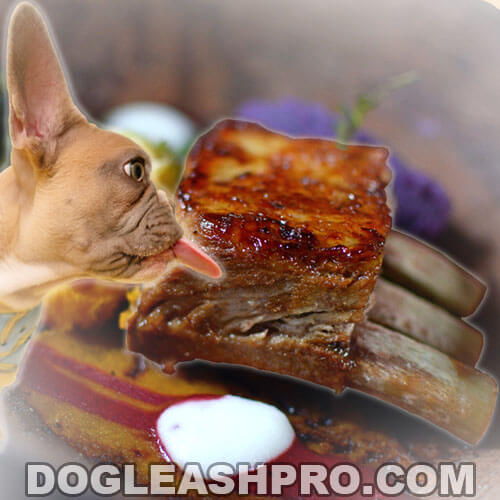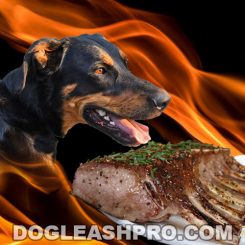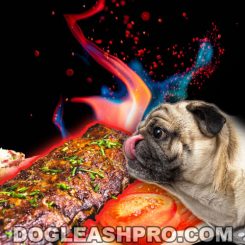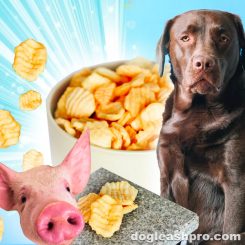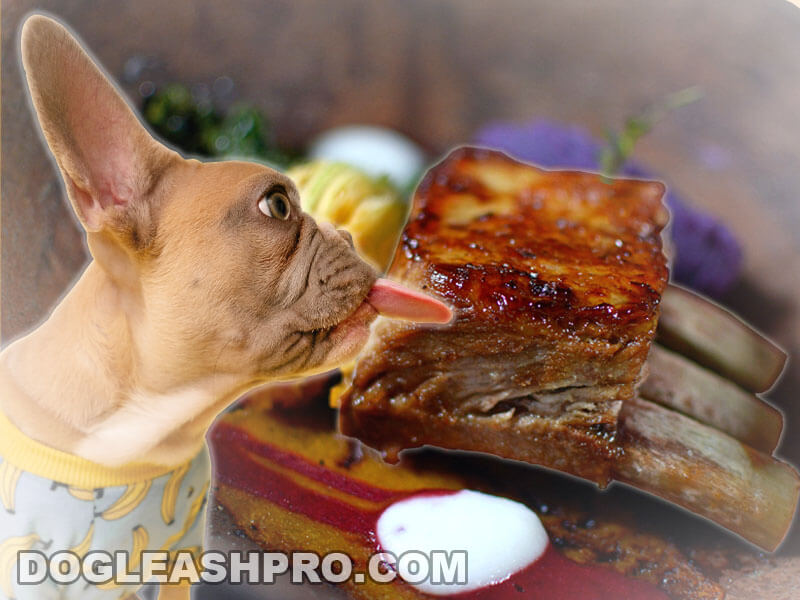
You’re probably having some roasted Pork Rib Bones and your canine companion just can’t get his eyes off of them. His eyes are following the Rib Bones from your plate to your mouth and you can see that he is also drooling. Now, you’re wondering, “Can a dog eat Rib Bones?” Here’s the short answer first.
Can dogs eat Rib Bones? It depends. Dogs should not eat Pork Rib Bones (raw or cooked) because their size can be a choking hazard. However, dogs can eat raw Beef Rib Bones under your careful supervision. It’s important to note that there are several health risks when feeding your dogs both raw and cooked Rib Bones. On a general note, avoid feeding your dogs cooked Rib Bones at all costs.
But don’t fret if your furry friends love to chew or are aggressive chewers. Scroll to the bottom of this article to find a list of safe alternatives to Rib Bones that your dogs can enjoy. For now, keep reading as we share everything you need to know about dogs and Rib Bones. We’ll cover various types of Rib Bones that are safe or unsafe for doggy consumption.
Table of Contents
Can dogs have Rib Bones?
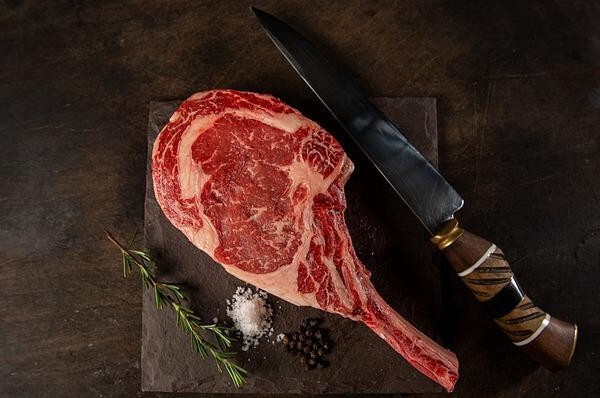
Maybe. Generally, dogs should not have Rib Bones.
If you’re thinking about sharing that leftover Pork Rib Bones with your furry friends, please don’t. Leftover Pork Rib Bones or Pork Rib Bones from table scraps mean that they are already cooked and cooked Pork Rib Bones are an absolute no-no for dogs.
The same applies to cooked Beef Rib Bones.
As a general rule of thumb, it’s best to avoid feeding your dogs cooked Rib Bones because they are dangerous to our canine friends. While cooked Rib Bones are not poisonous to dogs, our furry family members can face severe health consequences from gnawing or chewing the cooked Rib Bones.
When it comes to raw pork Rib Bones, the answer is an absolute no and we will discuss this in more detail below.
Some owners may feel comfortable sharing raw Beef Rib Bones with their canine friends because the bones are bigger.
Ultimately, you’ll want to consider the following before offering Rib Bones to your dogs:
- Is the Rib Bones raw or cooked?
- Size of your pooch.
- Your dog’s age.
- Size of the Rib Bones.
- Size and shape of your pup’s jaw and mouth.
- Does your dog already know how to chew Bones properly and safely?
- What is your dog’s previous experience with chewing Pork or Beef Rib Bones?
- Where did the raw Beef and Pork Rib Bones come from? Are they from a responsible and reputable grocery store that values safety and health as their main priority so that there’s minimal risk of bacteria, salmonella, and other contaminants on the bones and meat?
In the following sections, we’ll discuss in detail whether or not Rib Bones are safe for your furry friends.
Are Rib Bones safe for dogs?
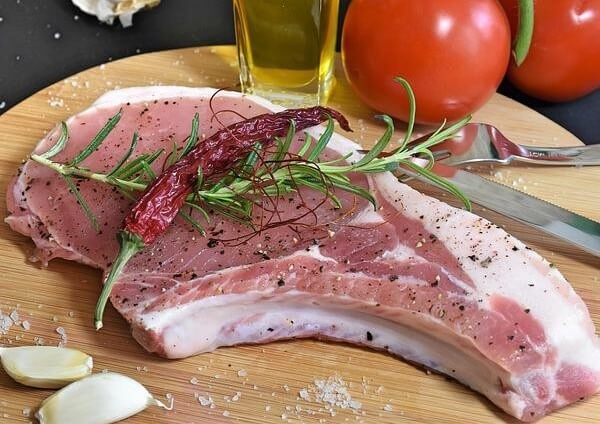
Cooked Rib Bones are not safe for dogs. As soon as you cook the Rib Bones, they are no longer safe for doggy consumption.
During the cooking process, the Rib Bones lose their moisture and firmness. This causes the Rib Bones to become very dry and brittle. When dogs chew or try to eat the cooked Rib Bones, the hard and brittle bones are more likely to break and splinter. The shards from the splinter are sharp and can cause tear or cut to your dog’s lips, tongue, mouth, or muzzle and lead to bleeding.
If your pooch tries to swallow the shards of bones, they may gag. The shards may then puncture your dog’s throat and esophageal lining and cause internal bleeding.
Once they enter your pup’s stomach and intestines, they’re known as foreign bodies and they can also pierce your dog’s intestinal tract lining.
Even worse, the shards or splinters can cause intestinal blockage and lead to bowel obstruction.
When this happens, it requires immediate medical attention and surgery to get rid of the shards.
As we can see, this may lead to an unexpected high vet medical bill that you were probably not planning for.
This internal bleeding is deadly because as dog owners, we won’t be able to see it and it may be too late before we realize our furry friends are in trouble and need medical attention.
Additionally, if you have small dogs, flat-faced (brachycephalic) dogs, or dogs with existing digestive issues or other health problems, it’s not a good idea to share Rib Bones with them.
Brachycephalic dog breeds include French Bulldogs, Pugs, Boston Terriers, or Boxers to name a few.
The size and shape of their jaw make it hard for them to chew the Rib Bones properly and safely.
Not to mention some dogs will have a hard time digesting bones.
But what about raw Rib Bones? Are they safe for doggy consumption? Let’s find out next.
Don’t miss: Can Dogs Eat Pork Rinds? (Chicharrones, Crackling, Pork Skins & Scratchings)
Are raw Rib Bones safe for dogs?
Raw Rib Bones are equally unsafe for dogs to eat. So, can dogs eat raw Rib Bones? No, dogs should not eat raw Rib Bones because doing so puts them at risk of severe health consequences as well.
Raw Pork Rib Bones may contain salmonella and other bacteria that are bad for dogs
When it comes to raw Pork Rib Bones, the meat and the bones may be coated with salmonella, bacteria, and other contaminants. It’s dangerous when dogs eat raw meat and bones that are contaminated with salmonella and other bacteria because they may become carriers of the bacteria and may infect other animals, pets, and people.
If you see the following signs and symptoms of salmonella infection in your pooch, we recommend that you contact your vet as soon as possible:
- Bloody and frequent diarrhea.
- Vomiting.
- Loss of appetite.
- Lethargy.
- Abdominal pain.
- Fever.
Also, some raw Pork Rib Bones and meat may carry Trichinella spiralis, a roundworm that can lead to Trichinosis in dogs. Trichinellosis is also known as Trichinosis, which is a parasitic disease. Sadly, Trichinellosis or Trichinosis can be transmitted to people.
Raw Pork Rib Bones may be infected with Trichinella spiralis which can cause Trichinosis or Trichinellosis in dogs
If your pooch accidentally ate raw Rib Bones or raw Ribs that have been infected with Trichinella spiralis, then he or she may experience the below signs and symptoms of Trichinosis or Trichinellosis:
- Vomiting.
- Diarrhea.
- Myalgia.
- Loss of appetite.
- Anorexia.
- Weight loss.
- Increase heart rate or abnormal heart rate.
- Increase body temperature.
- Muscle weakness.
- Muscle pain.
- Abdomen and face swelling due to edema.
- Depression.
- Lethargy.
If you notice your canine friend may have Trichinosis or Trichinellosis or salmonella infections, we highly recommend that you call your vet right away and bring your dog to the nearest doggy hospital.
RECOMMENDED: Can Dogs Eat Steak?
Raw Pork Rib Bones contain fatty tissues which are not healthy for dogs
You may also have noticed that the Pork Rib Bones contain fatty tissues and fat that can negatively affect your dog’s health. When dogs ingest fatty tissues, they may react by vomiting or having diarrhea.
If you notice your dog is vomiting a lot or has frequent diarrhea, contact your vet right away. This requires immediate medical attention because it can lead to the following symptoms:
- Dehydration.
- Upset stomach.
- Protein loss.
As a general rule, do not feed your canine friends high-fat food. In fact, dogs that eat Pork Rib Bones that contain tons of fatty tissues may be at risk of pancreatitis.
Observe your dog when he is chewing or eating raw Beef Rib Bones
When it comes to raw Beef Rib Bones, some owners do allow their dogs to eat them. However, before giving your furry friend the raw Beef Rib Bones, you’ll want to consider the size of the raw Beef Rib Bones and the size of your dog.
If you do allow your dog to gnaw or eat raw Beef Rib Bones, we highly recommend that you keep a close eye on your pooch when he is chewing or eating the raw Beef Rib Bones to avoid any choking or other serious health problems.
Read also: Can Dogs Eat Spoiled Meat? The Dangerous Truth!
Why do dogs eat Bones?
Most dogs love to chew. In fact, when our canine friends chew, it’s a great way for them to relieve their stress, tension, or any pent-up energy.
Dogs that are lonely, bored, or suffering from separation anxiety may resort to destructive behaviors like chewing furniture and valuable items around the house. As a result, many owners may give their canine friends a bone or two to keep them occupied and mentally and physically stimulated.
Dogs also love to eat and chew bones because the bones are quite tasty. The bones themselves contain calcium and the bone marrow inside the bones is high in fat. Additionally, if there’s any meat on the bones, you better believe that your dogs will try to eat it.
This is normal behavior because although our furry friends have been domesticated for centuries, they descended from wolves and their main meal has always been meat. If they see meat on the bones, they’ll try to chew the bones too.
However, not all bones are safe for doggy consumption. it’s important to note that we can’t just give our four-legged friends any type of bones. There are certain bones that we must avoid giving our dogs.
The good news is that there are certainly safer alternatives to give our dogs instead.
For instance, in our Best Dog Bones guide, we’ve listed at least 5 best dog bones for your canine friends. We’ve reviewed and compared all of them to bring you the best ones.
The dog bones we’ve recommended are made in the US, 100% natural, and durable. In addition, they’re great for both aggressive and moderate chewers alike.
Not only can the bones help to relieve your dog’s stress and tension, but they can also help to clean your dog’s teeth. That’s because the dog bones are multi-textured so they contain nubs and ridges that can scrape away plaque and control tartar buildup. Best of all, they aren’t too hard or abrasive on the gum or teeth.
What’s great about the dog bones we’ve recommended is that they come in various sizes including x-small/petite, small/regular, medium, large/giant, and x-large/souper. They also contain natural long-lasting flavors such as chicken, bacon, and peanut butter that will keep your dog busy for hours!
If you prefer to stay away from doggy bones altogether, no worries. Perhaps your canine companions will love playing with indestructible dog toys instead. These toys are tough enough to withstand even the most aggressive chewers. Be sure to check out our guide as we’ve provided a diverse list of durable dog toys including ultra balls, fetch balls, frisbees, and tug of war ropes that will keep your dogs entertained for days.
DISCLAIMER: THIS WEBSITE DOES NOT PROVIDE MEDICAL ADVICE
The information, including but not limited to, text, graphics, images and other material contained on this website are for informational purposes only. No material on this site is intended to be a substitute for professional veterinary advice, diagnosis, or treatment. Always seek the advice of your veterinarian or other qualified health care provider with any questions you may have regarding dietary needs.
Resources:
https://www.cdc.gov/salmonella/dog-food-05-12/pet-owners-info.html
https://en.wikipedia.org/wiki/Pork_ribs

With over five years of specialized experience as an animal writer, my expertise lies in dog nutrition, health, behavior, grooming, and training. I am dedicated to delivering helpful and informative content that caters to the well-being of our furry friends. My primary goal is to empower pet owners with knowledge and ensure our canine companions thrive in health and happiness. In my free time, I love volunteering at local dog rescue centers.
